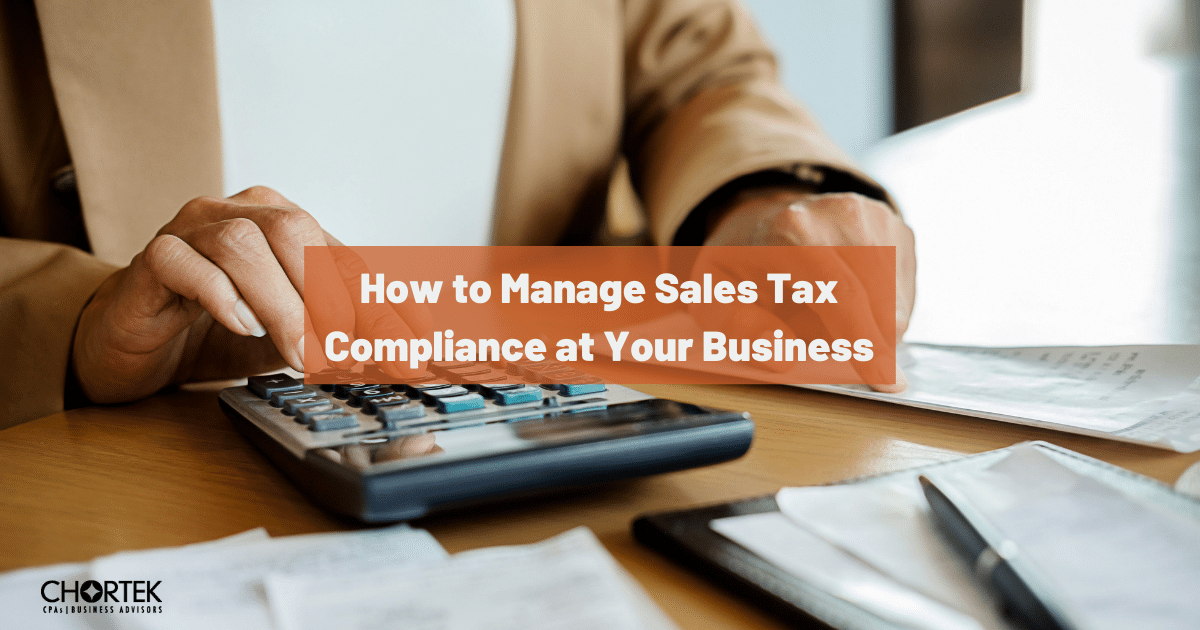How to Manage Sales Tax Compliance at Your Business
One of the main challenges business owners face is simply managing their time to fulfill all the necessary duties that come with running a business. Something that can steal a lot of time from business owners is dealing with state and local tax obligations. Keeping up with the constantly changing tax laws is a challenging task, especially when trying to run and grow a business at the same time. Staying compliant with tax laws is a necessity, however, so how can business owners best keep up with sales tax compliance while also growing their business? In this blog, we’ll examine both parts of that problem. First, let’s go over how to deal with changes in tax laws.
How to Keep up With Changes in State Sales Tax Compliance
Businesses are operating in an ever-changing landscape of state sales tax compliance revelation. Changes in how people purchase products and services have been dramatic. Online shopping sales continue to rise and reached new highs during the COVID-19 pandemic. Many businesses are now scrambling to transition to or better incorporate online selling into their business models.
The changes in consumer behavior have also brought about changes in taxation. New indirect taxes are being introduced as newer business models become more prominent such as those placed on streaming services and Airbnb rentals. All 50 states have different tax laws as well as their own local taxing authorities, so keeping up with changes in tax laws can be quite complicated and will vary based on where the business operates. Altogether, there are more than 11,000 taxing jurisdictions in the country.
With the rise of online shopping and more businesses selling to out-of-state customers, new laws were introduced. A major change occurred in 2018 with the United States Supreme Court Case of South Dakota v. Wayfair, Inc. This case determined that states may charge tax on purchases made from out-of-state sellers, even if the seller does not have a physical presence in the taxing state.
How to Deal With Changes
With changes constantly occurring, what can businesses do to efficiently handle these changes? Automation is the key to dealing with these changes. As Avalara sees it, there are five things for businesses to think about when dealing with tax compliance:
- Know where you have an obligation to collect tax
- Once you know where you have an obligation, get registered with those taxing authorities
- Understand what products are taxable and not
- Calculate the accurate sales tax rates, know what the rates are, and know when they change
- Collect the taxes and remit them to the relevant authorities
Avalara has helped simplify this 5-step process by offering a free risk assessment tool. This tool will help you identify areas where you may have created a sales tax nexus and where you have an obligation to collect sales tax.
Ecommerce programs, with other third-party add-ons, like AvaTax, make the transition easier than ever before to integrate offline and online selling. The pandemic saw a rise in consumers shopping online and doing in-store/curbside pickups. Businesses need to track these transactions and their respective sales taxes. Luckily, such tracking is easily done through automation.
When dealing with online sales, the checkout options are also important and will highly relate to customer satisfaction. Different payment types and return options along with tax calculations matter. Shipping options and associated taxes need to be accurate. This also matters if your selling on a marketplace, like Amazon. This can make it very complex but can be simplified through automation.
AvaTax can help get the tax right automatically and can help you know if items are taxable. Avalara can also manage exemption certificates and file your sales and use tax returns to the various state and taxing authorities. Managing sales tax compliance is even easier if you qualify for the Streamlined Sales Tax program. This state-run program covers the cost of using software like Avalara in certain circumstances.
What to Keep in Mind as Your Business Grows
Achieving growth is something all business owners hope to see. However, when a business starts to expand outside of its original state(s), this also creates additional, and often unexpected, sales tax burdens. If you’re focusing more on the day-to-day duties of running your business, you may feel unprepared to deal with the additional tax burdens. So, what things do you need to keep in mind as your business grows?
The obligation to collect or remit sales tax is known as a nexus. Having a physical presence in a state or reaching a particular sales threshold are just two of the factors that can establish a nexus. The latter factor is particularly important for remote sellers who reach a sales threshold in states outside of where the company operates its physical locations. Has your business seen an increase in online sales? If so, this may create additional sales tax nexus if the orders are from multiple states or jurisdictions.
Another way growth can trigger a nexus is through hiring additional employees. This is particularly important in the case of remote workers who work in another state. With remote work becoming more common, more businesses now have employees working remotely in different states. With that in mind, business owners need to be conscious of tax obligations when hiring remote workers.
What are the Penalties for Not Collecting Sales Tax?
At this point, you’re probably curious about what would happen if you didn’t collect and remit sales tax your business had an obligation to collect. This can happen through no fault of the owner who simply isn’t aware of a sales tax nexus. A local tax jurisdiction would typically discover this by performing an audit. Once discovered, your business is likely going to face some penalties from your state taxing authorities.
These penalties vary from state to state and suffice to say that it’s best to avoid these penalties. In Wisconsin, for instance, the penalty is 5% of the tax owed per month or fraction with up to a maximum of 25% on top of paying the sales tax that is owed. For smaller businesses, having to pay this extra penalty can be a significant financial setback.
To prevent that scenario, it’s crucial to stay up to date and informed on tax laws and where you have an obligation to collect. If you have any questions regarding sales tax compliance, contact us today!




